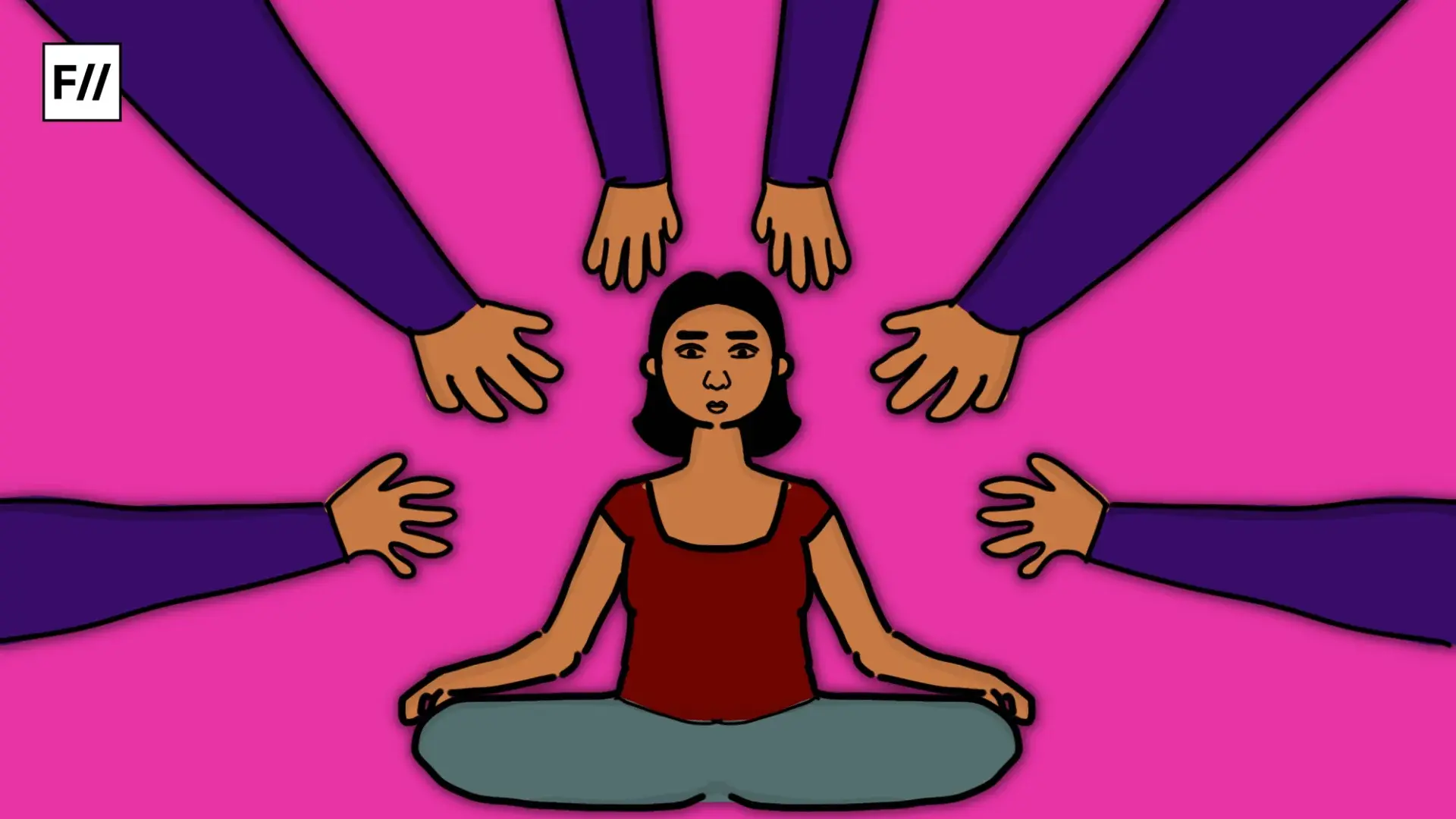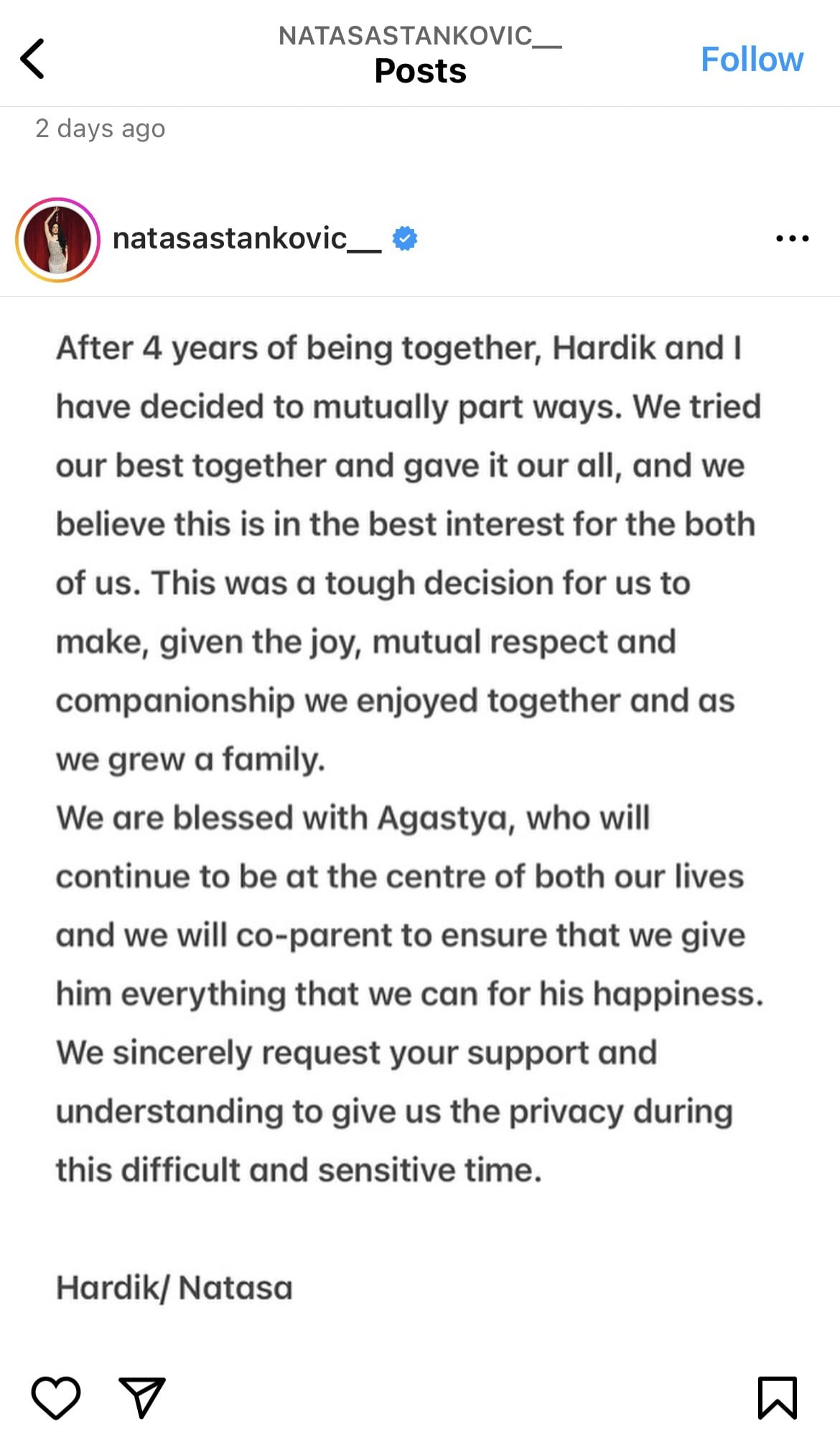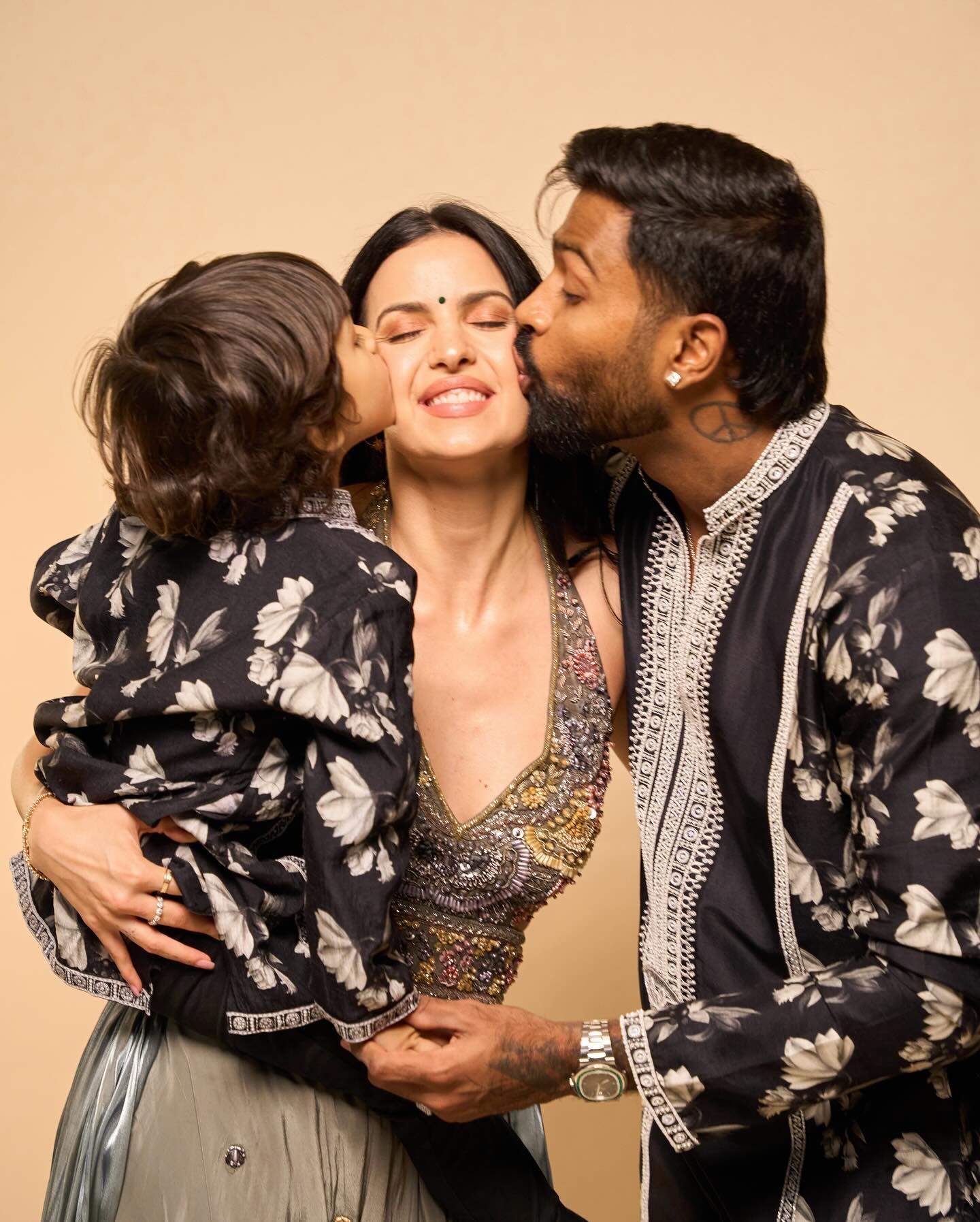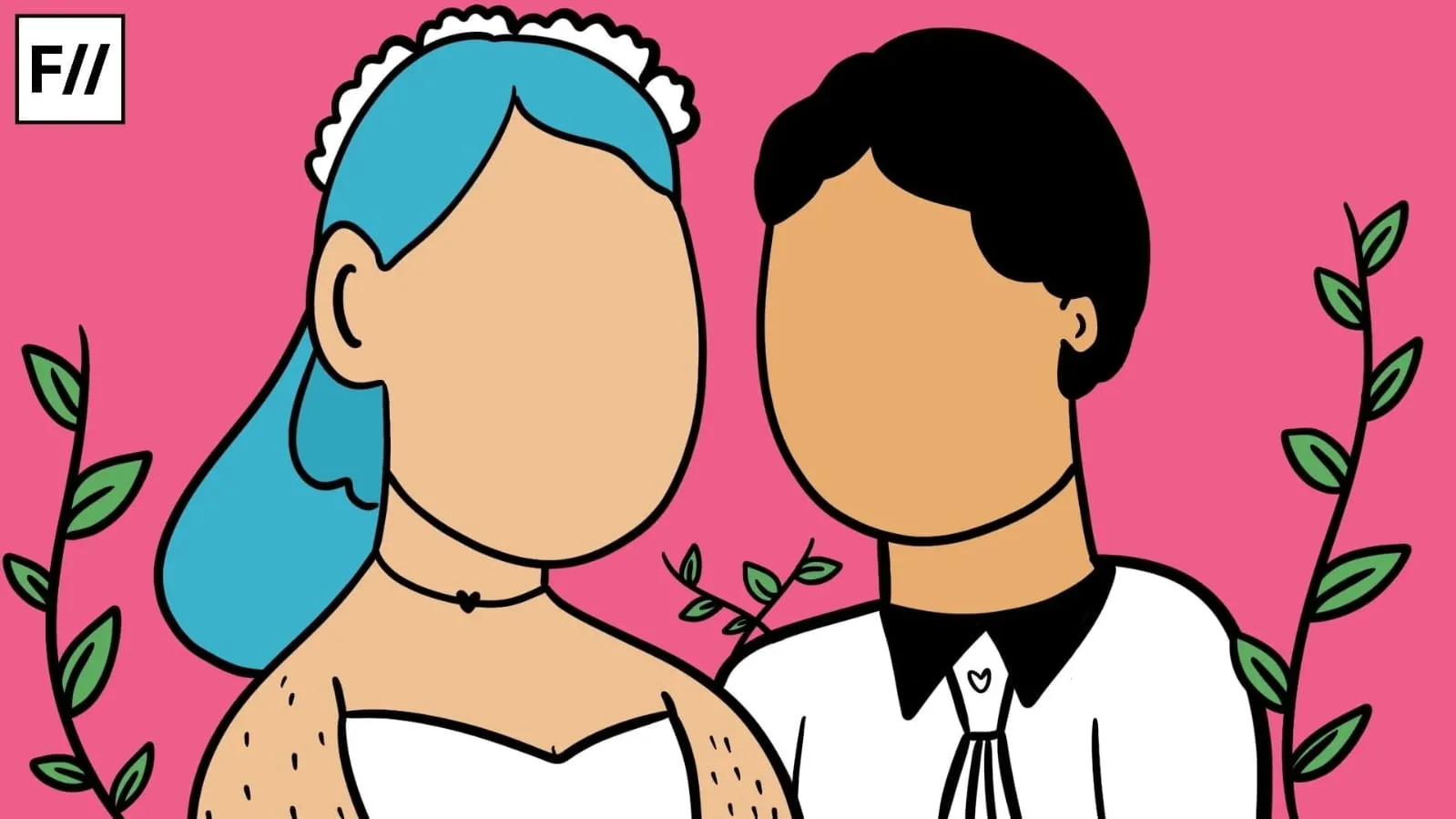In India, marriage is traditionally viewed as a sacred institution, with divorce often considered a social taboo. In Indian culture, marriage is not only a personal commitment between a man and a woman but also a socially sanctioned union. The expectation is that couples maintain harmony and meet each other’s expectations to fulfill their marital duties. However, when this balance is disrupted, it can lead to divorce, which is considered as one of the biggest problems in Indian society.
The recent announcement of Hardik Pandya and Natasa Stankovic’s divorce and the public reaction to it highlights this mindset of Indian society.
The recent announcement of Hardik Pandya and Natasa Stankovic’s divorce and the public reaction to it highlight this mindset of Indian society. Since the rumours and announcement of divorce between the two, model-actress Stankovic has faced a barrage of online hate, including slut-shaming and accusations of being a “gold digger”, highlighting ongoing issues with public perceptions about divorce and gender roles in Indian society.
The concerning pattern of gendered double standards
On July 18th, Hardik and Natasa publicly announced their separation via an Instagram post, sharing that the decision was mutual and expressing their commitment to co-parenting their son respectfully. Despite their effort to handle the situation maturely, there was an unfortunate tendency for people to speculate and place undue blame on Natasa. The reaction against her intensified even before the official announcement, people had assumed that it was probably Natasa’s fault that their marriage ended. It’s highlighting a concerning pattern of unfairly targeting women in such situations.
Natasa Stankovic, a Serbian-born artist, is recognised for her diverse roles as a model, actress, dancer, and producer in Bollywood. After she moved to Mumbai in 2012, she gained prominence through various advertisements and film projects. She met Indian cricketer Hardik Pandya in 2018, and their relationship quickly blossomed. Hardik proposed to Natasa in early 2020, and they held a private wedding ceremony in May 2020. Their son, Agastya, was born in July 2020.
No sooner had the couple made their announcement than the internet quickly took sides. While the cricketer received an outpouring of love, support, and sympathy, Natasa faced a wave of hate, disrespect, and slander.
Online discourse surrounding Hardik Pandya and Natasa Stankovic reveals a troubling trend in how people engage with public figures.
Online discourse surrounding Hardik Pandya and Natasa Stankovic reveals a troubling trend in how people engage with public figures. Fans of Hardik Pandya have been seen targeting Natasa with derogatory comments, often filled with hostility and judgment. While supportive messages such as ‘stay strong’ and advice like ‘don’t trust women’ are directed at Pandya, Natasa’s posts are met with harsh slut-shaming and criticisms, including comments like ‘Hardik deserved better.’ This stark contrast highlights a concerning pattern of gendered double standards and the ways in which public figures are treated differently based on their gender.
Slut-Shaming and misogyny towards Natasa Stankovic
‘Once a bar dancer always a bar dancer,’ one of the users wrote. ‘Dusman mile hazar par wife na mile chinar’ wrote another user. The trolling was so extreme that one of the users even compared her to a sex worker.
This online harassment directed at Natasa is a stark reminder of the troubling misogyny that persists in our society. Comments such as ‘Once a bar dancer, always a bar dancer’ and ‘Dusman mile hazar par wife na mile chinar’ not only reveal a deep-seated disrespect but also a harmful tendency to dehumanise and demean women based on their past choices or occupations.

Such extreme trolling is not just a reflection of individual prejudices but a manifestation of a broader societal issue where women’s worth is often diminished and their dignity undermined. This kind of online abuse perpetuates a cycle of misogyny that discourages open dialogue and mutual respect.
Accusations of being a gold digger on Natasa Stankovic
‘She was only with Hardik for his money,’ said another user. ‘If there was mutual understanding and mutual relationship then 70% money should not be taken,’ said another user. This type of derogatory comments targeting Natasa, reflect a deeply troubling trend of public shaming. It’s important to note that these reports about Natasa seeking 70% of Hardik’s assets remain unsubstantiated and unverified.
Not only that, but some people crossed the line when a meme page with a huge number of followers called Natasa’s marriage to Hardik a good ‘Business Idea’. That post had thousands of likes and comments, in which it was said, ‘First, marry a rich celebrity, then have one or two children. After three or four years, get divorced and grab 70 percent of his property. The rest of your life will be spent doing nothing. Isn’t it an amazing business idea?’ This reflects the deeply prevalent mindset in our society that a woman, no matter how capable she is, cannot be seen beyond the role of being financially dependent on a man.
It raises a critical question: Is it justifiable to subject someone to such intense scrutiny and derogatory remarks for making personal decisions that are based on mutual consent?
It raises a critical question: Is it justifiable to subject someone to such intense scrutiny and derogatory remarks for making personal decisions that are based on mutual consent? The tendency to vilify Natasa, rather than respecting her choices and acknowledging the lack of concrete evidence, underscores a broader issue of societal judgment and disrespect towards women. It’s reflects a broader misogynistic attitude in our society.
Celebrity separations and misogyny
The personal lives of celebrities are often under intense scrutiny from the public, with their marriages, seperation, divorces, and personal affairs frequently making headlines. This fascination extends to the sharing of stories, where people often speculate and gossip, blending truth with fiction. Each narrative typically includes archetypal elements: a hero, a villain, and numerous anonymous sources that contribute to the unfolding drama. But, if there is one thing that remains constant in the entire narrative, the villain of the piece is the same, the woman.
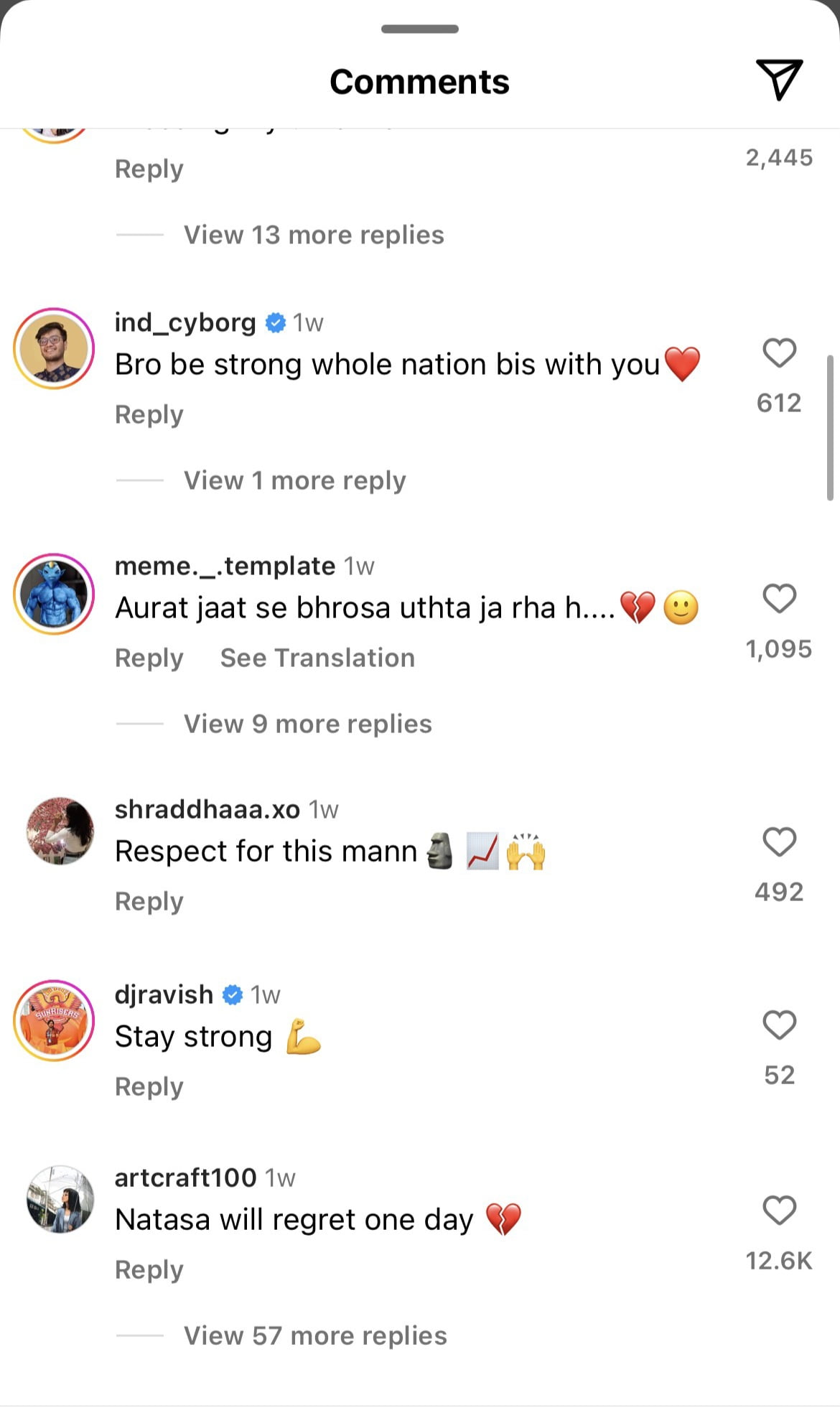
Celebrity separations often spotlight underlying societal issues, including misogyny. High-profile breakups can reveal how media and public perceptions are influenced by gender biases. For instance, Malaika Arora faced harsh criticism for her relationship with Arjun Kapoor following her divorce from Arbaaz Khan. Similarly, Sussanne Khan encountered scrutiny after her separation from Hrithik Roshan. Recent examples include Kusha Kapila, who faced blame for her rising fame impacting her relationship. When Kusha Kapila and Zorawar announced their separation, many people unfairly blamed Kusha. Trolls suggested that her rising fame was the cause of the relationship’s difficulties. More recently, Sophie Turner was criticised for allegedly prioritising social activities over parenting in her split from Joe Jonas, while Amber Heard faced backlash for accusing Johnny Depp of abuse.
In these cases, it seems that women are frequently blamed, regardless of the multifaceted nature of their situations. Celebrity separation often brings to light the intersection of media sensationalism and societal attitudes, particularly concerning gender. When high-profile couples split, media coverage frequently delves into intimate details, often amplifying misogynistic narratives.
When high-profile couples split, media coverage frequently delves into intimate details, often amplifying misogynistic narratives.
Women, in particular, are scrutinised more harshly; their worth and character are frequently judged based on their relationship status, and they are often blamed or reduced to stereotypes. This reflects broader societal tendencies to view women through a lens of personal failure or inadequacy, rather than acknowledging the complex, multifaceted reasons behind relationship breakdowns.
The intense scrutiny and harassment faced by Natasa Stankovic following her divorce from Hardik Pandya underscore the pervasive misogyny and double standards that continue to plague societal attitudes towards women, particularly in the context of celebrity separations. The disproportionate backlash against Stankovic, including slut-shaming and accusations of gold-digging, highlights a troubling pattern where women are unfairly targeted and judged more harshly than their male counterparts.
This case exemplifies a broader issue within Indian society and beyond, where women are often reduced to stereotypes and judged based on outdated and sexist views. As we continue to navigate the complexities of personal relationships and public perceptions, it is crucial to address these biases and foster a more respectful and equitable discourse around gender and divorce.
